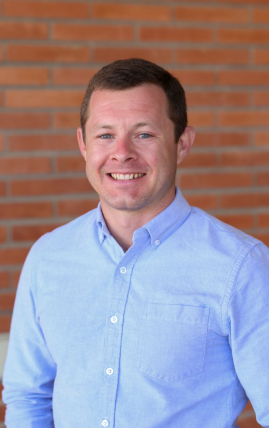
Date:
Tumors are generally stiffer than the healthy tissue that surrounds them, and research shows that a stiffer tumor can contribute to the cancer’s progression. But exactly how a stiff tumor affects a cancer cell’s epigenome, the set of chemical modifications on a cell’s DNA that regulate expression of genes, remains unknown.
Ryan Stowers, an assistant professor of mechanical engineering at UC Santa Barbara, has just been awarded a 2022 Young Investigator Grant (YIG) from the Breast Cancer Alliance (BCA). It was one of only five such awards given this year to support research aimed at identifying the biochemical pathway that drives the initiation and progression of cancer. The award provides early-career faculty with $125,000 in critical seed funding to generate the proof-of concept evidence needed to apply for larger, longer-term grants, often with the National Institutes of Health (NIH).
“I am thrilled and honored to receive this grant, as only a handful of them are given out each year,” said Stowers, adding that the two-year grant will fund a PhD student, research supplies, and fees to utilize shared facilities. “This funding will help support some of my lab’s initial projects in the area of cancer mechanobiology, and the recognition it provides will help to establish us in the cancer research community.”
Broadly, mechanobiology is the study of how cells interface with and respond to their environment by changing how they appear and how they act.
Recently, the Stowers group demonstrated the first direct evidence that stiff environments can induce cancer-like behaviors through changes to the epigenome.
In his BCA-supported project, titled “Understanding Epigenomic Remodeling Inducted by Tumor Mechanical Properties,” Stowers will investigate how the genome, the complete set of DNA in a cell, is reorganized in response to stiff environments. Epigenomic regulation, in part, enables the cell to express only certain genes, and not the entire DNA genome, a control mechanism that is disrupted in many cancers.
“In this research, we are trying to connect the molecular dots between the stiff environment outside of a cell and the altered gene expression and behavior of the cell itself, in order to identify a novel mode of cancer regulation,” said Stowers, who joined UCSB’s College of Engineering faculty in 2019 after earning his PhD in biomedical engineering from the University of Texas at Austin. “It has become increasingly clear that the stiff-tumor microenvironment can cause changes in cancer-cell behavior that exacerbate the disease.”
Researchers in the Stowers lab create artificial tumor microenvironments by encapsulating cells in three-dimensional, mechanically tunable hydrogels. This allows them to more closely mimic the natural tumor environment, compared to culturing cells on flat, unnaturally hard petri dishes made of plastic or glass.
“We will use these hydrogels to precisely control the stiffness the cells are exposed to, and then evaluate the extent to which their epigenomes are remodeled,” he explained. “Over the course of the two-year award, we will aim to identify the molecular pathway through which this stiffness sensing and signaling occur, and we will use high-throughput sequencing techniques to map out the changes we see.”
The team also plans to investigate how long the epigenomic changes induced by the tumor microenvironment persist. Their findings could also explain why tumor cells demonstrate the so-called memory effect, a phenomenon in which cancer cells, after being primed by a stiff primary tumor, then invade the surrounding tissue and migrate away from the tumor. Epigenomic memory imparted to the cells could explain why cells persistently invade during metastasis.
“This project is still very much about basic discovery and exploration,” said Stowers. “However, if successful, we could uncover a new pathway that promotes breast cancer progression, which would provide targets for therapeutic intervention.”



